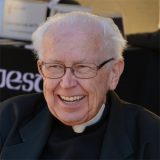
Sixteenth Sunday in Ordinary Time (Homily)
July 17, 2016 7:00 am · Father Jim Blantz

People send me all kinds of crazy things from the Internet, one of them came through the other day that applies to this sermon. It seems that up in Nevada someplace in front of a Sports Bar. There is one of these doomsday prophets running around, long white robe, sandals, hair all messed up and scraggly beard and so on carrying a big sign. Beware Duffy's Sports Bar is a den of sin and inequity, never a cover charge. In the years 200, 300 and 400, most of the big cities in Europe and Africa, Cairo, Alexandria, Athens, Rome and so on were dens of sin and inequity. In order to avoid the sinning, many people would go out into the desert. Find a place where there was water, build a little hut, make a garden and spend their lives out there in the desert as hermits. We have many of them as saints on out calendar of Saints. But Saint Benedict's feast day was this week and it reminded me that Benedict then in the year 525, almost 1500 years ago, decided that a good idea was to bring these hermits together into a monastery and live a community life.
It was the beginning of the religious life as we know it today. He had a great idea, he would get these men in there and they would grow their own food, and take care of their own cattle, sheep and oxen and so on. Grow their own food, get up in the morning, say their prayers, have their breakfast, go out in fields and work, come back in and say some noon prayers, take a nap, go out into the fields and work again, come in have evening prayer, have some recreation and go to bed. It was great because it was an orderly day and you knew when you were going be at prayer, and time was set aside that you would say that prayer in community. So it worked out very well for a while.
But then the neighboring farmers started to come in and to ask questions. "Benedict, you've got people in there that can read and write." Which relatively rare at the time. Benedict said, "Yeah, I have got a couple of brothers here who can read and write."
"Would you have them teach our children to read and write."
Benedict said, "No we can't do that we need these guys out in the field to take care of our cattle and so on."
"If you teach our kids to read and write, we'll give you a cow or a goat or a sheep or whatever it might be. We'll pay you in a sense to educate our children."
So Benedict built a little building done at the edge of the property, and for a couple of hours every day, the brothers who could read and write would go down and teach the farmers' children. That is how the Church got into the education business.


